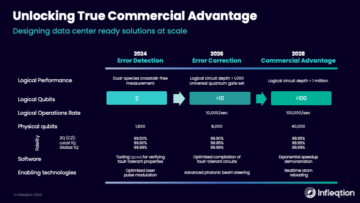
Quantum computing is no longer confined to science fiction or academic research; it is rapidly becoming a reality that promises to revolutionize various industries, including business and leadership strategy. The potential of quantum computing to solve complex problems at unprecedented speeds opens up new avenues for innovation, optimization, and competitiveness. While this technology is still nascent, organizations like the Quantum Strategy Institute or the U.S.’s National Quantum Initiative are already promoting the intersections between quantum technology and strategy, showing how quantum could improve businesses or governmental policies.
How Quantum Computing Might Affect Business Strategy
Part of business strategizing is understanding where things can be optimized or automated. Quantum computing is promised to solve optimization problems like supply chain management, portfolio optimization, and route planning. Businesses can leverage this technology to minimize costs, maximize efficiency, and enhance decision-making processes. For instance, logistics companies can optimize their delivery routes in real time, reducing fuel consumption and delivery times.
Depending on the industry, other companies may leverage simulations to strategize their businesses’ success. Quantum computing could also simulate these complex systems, from drug interactions in pharmaceuticals to material properties in manufacturing. This capability allows businesses to accelerate research and development, leading to faster product innovation and reduced time-to-market. These simulations can also provide a more accurate timeline for businesses to utilize when pitching to investors, budgeting for the next financial year, or planning for new hires.
Other potential benefits of quantum computing for business strategy focus on data management and data security. Quantum computing is predicted to analyze enormous data sets at a faster and more optimized rate, allowing for better and quicker analyses that businesses can use to make informed decisions. This technology is also promised to ensure better security for data and other sensitive information, which can help businesses stay protected against hackers or other malicious players.
How Quantum Computing May Affect Leadership Strategy
Besides business strategy, leadership strategy may also be impacted by quantum computing. Leaders must be proactive in understanding the potential of quantum computing and how it affects their industry. Investing in quantum education and research is essential for staying competitive. Additionally, quantum computing offers the potential to disrupt traditional business models. Leaders must encourage innovation within their organizations, exploring how quantum technology can create new revenue streams or improve existing processes.
Though quantum computing is still in its early stages, its predicted benefits and impacts make it a hot topic when discussing strategy for both leadership and business. As the technology matures, the ability to harness its power will be a key differentiator for organizations seeking to maintain their competitive edge and drive innovation in an increasingly quantum-driven world.
Kenna Hughes-Castleberry is a staff writer at Inside Quantum Technology and the Science Communicator at JILA (a partnership between the University of Colorado Boulder and NIST). Her writing beats include deep tech, quantum computing, and AI. Her work has been featured in Scientific American, Discover Magazine, Ars Technica, and more.
- SEO Powered Content & PR Distribution. Get Amplified Today.
- PlatoData.Network Vertical Generative Ai. Empower Yourself. Access Here.
- PlatoAiStream. Web3 Intelligence. Knowledge Amplified. Access Here.
- PlatoESG. Automotive / EVs, Carbon, CleanTech, Energy, Environment, Solar, Waste Management. Access Here.
- PlatoHealth. Biotech and Clinical Trials Intelligence. Access Here.
- ChartPrime. Elevate your Trading Game with ChartPrime. Access Here.
- BlockOffsets. Modernizing Environmental Offset Ownership. Access Here.
- Source: https://www.insidequantumtechnology.com/news-archive/inside-quantum-technologys-inside-scoop-quantum-and-strategy/
- :has
- :is
- :where
- $UP
- 08
- 2023
- a
- ability
- academic
- academic research
- accelerate
- accurate
- Additionally
- affect
- affects
- against
- AI
- Allowing
- allows
- already
- also
- American
- an
- analyze
- and
- ARE
- AS
- At
- Automated
- avenues
- BE
- becoming
- been
- benefits
- Better
- between
- both
- budgeting
- business
- business models
- business strategy
- businesses
- by
- CAN
- capability
- Colorado
- Companies
- competitive
- competitiveness
- complex
- computing
- consumption
- Costs
- could
- create
- data
- data management
- data sets
- Decision Making
- decisions
- deep
- deep tech
- delivery
- Development
- different
- differentiator
- discover
- discussing
- Disrupt
- drive
- Early
- Edge
- Education
- efficiency
- encourage
- enhance
- enormous
- ensure
- essential
- Ether (ETH)
- existing
- Exploring
- faster
- featured
- Fiction
- financial
- Focus
- For
- from
- Fuel
- future
- hackers
- harness
- help
- her
- High
- hires
- HOT
- How
- HTTPS
- image
- impacted
- Impacts
- improve
- in
- include
- Including
- increasingly
- industries
- industry
- information
- informed
- Innovation
- inside
- Inside Quantum Technology
- instance
- investing
- Investors
- IT
- ITS
- jpg
- Key
- leaders
- Leadership
- leading
- Leverage
- like
- logistics
- longer
- magazine
- maintain
- make
- management
- manufacturing
- material
- matures
- max-width
- Maximize
- May..
- McKinsey
- might
- minimize
- MIT
- models
- more
- must
- nascent
- National
- New
- next
- nist
- no
- of
- Offers
- on
- opens
- optimization
- Optimize
- optimized
- or
- organizations
- Other
- Partnership
- pharmaceuticals
- pitching
- planning
- plato
- Plato Data Intelligence
- PlatoData
- players
- policies
- portfolio
- posted
- potential
- power
- predicted
- Proactive
- problems
- processes
- Product
- Product Innovation
- promised
- promises
- promoting
- properties
- protected
- provide
- Quantum
- quantum computing
- quantum education
- quantum technology
- quicker
- rapidly
- Rate
- real
- real-time
- Reality
- Reduced
- reducing
- research
- research and development
- revenue
- revolutionize
- Route
- routes
- s
- Science
- Science Fiction
- scientific
- scoop
- security
- seeking
- sensitive
- Sets
- showing
- SOLVE
- speeds
- Staff
- staff writer
- stages
- stay
- Still
- strategies
- strategize
- Strategy
- streams
- success
- Systems
- tech
- Technology
- that
- The
- The Future
- their
- These
- things
- this
- time
- timeline
- times
- to
- topic
- traditional
- true
- types
- understanding
- university
- unprecedented
- use
- utilize
- various
- when
- which
- while
- will
- within
- Work
- world
- writer
- writing
- year
- zephyrnet












